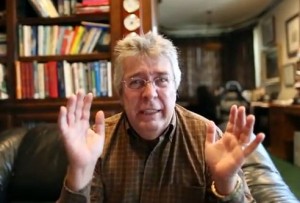
Luis Garcia, seen in a recent video by Tiziano Lugli
UPDATE: See attorney Scott Pilutik’s thoughts on the lawsuit, below.
In 1993, the Internal Revenue Service granted Scientology tax exempt status, but the church was still beholden to an earlier Supreme Court decision that required it, as in a business, to give members refunds when they requested them.
Now that Scientology is in the grips of crisis and more and more longtime members like the Garcias are walking away from the church, an increasing number of them have asked for refunds — and the church isn’t giving them.
We’ve written about this state of affairs numerous times. Now, the Garcias have filed a lawsuit that accuses church leader David Miscavige of turning Scientology into little more than a fraudulent money-making scam.
“The Church, under the leadership of David Miscavige, has strayed from its founding principles and morphed into a secular enterprise whose primary purpose is taking people’s money,” the complaint says.
A year ago, when Debbie Cook sent out her explosive e-mail to fellow church members, she accused Scientology leader David Miscavige of turning Scientology away from its original goals and instead put all the recent emphasis on his pet projects, including the “Super Power” Building in Clearwater, Florida and the church’s defense fund, the International Association of Scientologists. But even though church members are under intense pressure to donate to these projects, they are never told how the money is used. Cook accused Miscavige of using the donations to amass a billion-dollar slush fund for his personal use. The Garcias make a similar complaint, saying that they gave about $420,000 in donations for the Super Power Building project, the IAS, and for services at the “Flag Land Base” in Clearwater. They were repeatedly assured that the money would be used for specific reasons that they now say were all lies.
(The Super Power Building first broke ground in 1998, and its exterior appears finished. But its wild interiors are apparently still being remodeled, and the facility has never been opened. When it does open, it’s supposed to deliver “super power” processes to wealthy high-level church members. The cost to build the structure have ranged as high $100 million, but the church has raised about $145 million, reports the Tampa Bay Times.)
The Garcias and their attorneys are about to hold a press conference, and we’ll be listening in telephonically and taking notes. We’ve had time only to read through the complaint once, and we’ll be adding to this story as we learn more.
— Luis Garcia, in the press conference: “Every time I was asked for a donation for the [Super Power] Building, I was told it would open within a year. I was lied to.”
— Ted Babbitt, Luis’s attorney, says that the lawsuit is not about Luis wanting the Super Power building open, but about the lies. “We can’t wait to see the finances” that will come out in discovery, he says. Oh, we can imagine he is looking forward to that.
 — Babbitt: “I’ve sued the biggest companies in the United States…I’m not afraid of taking on the Church of Scientology.”
— Babbitt: “I’ve sued the biggest companies in the United States…I’m not afraid of taking on the Church of Scientology.”
— Babbitt: The complaint alleges that these donations have provided David Miscavige’s “high lifestyle.”
— Babbitt: Says he knows of hundreds of other former Scientologists who are just waiting for a lawsuit like this. He thinks he will end up representing many of them. They expect to end up representing HUNDREDS of people, but they do NOT plan to turn it into a class action.
(That’s really a good thing. Although we see our readers often extoll the idea of a class action lawsuit, the reality is that class action lawsuits totally blow, and they only end up enriching attorneys.)
— Luis Garcia: “They stay on you for hours, sometimes for days, until you cave in and give a donation….They have no mercy at all. Money has to be extracted at all costs…It’s unbelievable how much pressure you’re put under.”
— I’m told that five local TV crews are covering the press conference, as are Joe Childs and Tom Tobin of the Tampa Bay Times.
— Babbitt says he’s looked at every lawsuit against Scientology in Florida. This suit, however, he believes involves NO First Amendment issues, which the church usually appeals to in order to get out of lawsuits.
— Babbitt: “If we are correct that the [Super Power] building is not being opened so it can be used to amass more donations” — even though much more than necessary has already been raised to finish it, then that’s fraud, and they win their case.
— The lawsuit alleges five counts of fraud, two counts of unfair and deceptive trade practices and two counts of breach of contract.
— The lawsuit names five Scientology entities as defendants: The Church of Scientology Religious Trust; the Church of Scientology Flag Service Organization (FSO), which runs Scientology’s spiritual mecca in Clearwater; the Church of Scientology Flag Ship Service Organization, which operates Scientology’s private cruise ship, the Freewinds; the IAS Administrations (IASA), which runs the IAS, and the United States IAS Members Trust.
— The lawsuit has been assigned to federal judge James D. Whittemore.
— The Garcias are from Orange County, California, where Luis was also hit up for donations for the church’s “Ideal Org” there. He posted an amazing account of the way that process worked at Marty Rathbun’s blog.
— In the press conference, Babbitt talked about the way church members are told they have to go through Byzantine procedures to request a refund, which is the church’s way of getting them to give up. We reported a similar case recently, involving a Scientologist in South Africa. He said he asked for his money on account after he was “declared a suppressive person” — excommunicated, in other words. He said the church told him he could only request a refund if he filled out a form he could only obtain inside a Scientology “org” or church. But he was then told that because he was declared, he couldn’t go in the org to get the form. Amazing. That’s the kind of thing this lawsuit is aiming at.
UPDATE 1:15 PM We asked our legal department, also known as Manhattan attorney Scott Pilutik, to give us some thoughts on this lawsuit. Here’s what he sent us…
I like how the complaint immediately distinguishes the religion/not-a-religion question because this is always the overriding concern for any judge in a lawsuit against a religion. The judge wants to know that this case can be decided on neutral principles of law and doesn’t require doctrinal inquiry and paragraph 4 of the complaint makes that assurance, that instead this case is about contract, fraud, misrepresentation, and unfair business practices.
The fraud claim pits Scientology’s excuses to its members that the Super Power Building was incomplete because of lack of funds against its assurances to the city of Clearwater that delays were due to non-monetary considerations (i.e., building codes, bureaucratic complexity). These competing assertions are both well-documented and require little in the way of testimony, and will be difficult for Scientology to reconcile. Discovery involving testimony of Clearwater officials necessary? Monetarily, this is the biggest and therefore most important claim here, so it’s good news that (in my opinion anyway), it’s the strongest of the claims.
With regard to the Freewinds/FLAG refund, we’ve been down this road before but I love how this claim focuses on the quid pro quo donations legal fiction Scientology has skated by on for decades now. If the judge wanted to, he could possibly go down the road last traveled by the Sklars and direct that examination of the IRS-Scientology secret agreement is necessary to deciding this claim. Which would be awesome (but I’m not holding out too much hope).
Garcia’s claim that the IAS donations were fraudulently induced is certainly valid but perhaps problematic. Scientology will likely argue that (a) no such donations-for-project-X assurances were given; (b) donations given to IAS aren’t earmarked for specific projects but rather go into larger pot, and that IAS involves itself in many projects; and (most importantly) (c) any inquiry into IAS’s fundraising activity and the application of its donations would unconstitutionally entangle the court in church governance matters. I’m also unclear as to why the complaint doesn’t offer an explanation of how, in each instance of inducement, it was discovered that the donated funds were not being used for their stated purpose.
By and large though, this is really good stuff, and as Babbitt suggests, Garcia’s claims are fairly universal — so many members were shaken down in the same manner and could wind up joining this or filing similar suits. Consequently, Scientology will less motivated to settle because of the reasonable fear that others will soon line up behind Garcia. Only by getting the suit dismissed outright will they send the message they want and need to send. And that may be a difficult task here.
UPDATE 1:30 PM Just got off the phone with Ted Babbitt after asking a couple of follow up questions.
We asked what he expects to be the next development in the case, and he said the church will likely move to dismiss the case on First Amendment grounds. “And there will be a bushel basket of papers filed by their attorneys,” he says.
When should we expect that? “They have to answer within 20 days from the time they are served. And they are being served as we speak.”
Is deposing David Miscavige high on the list of priorities?
“That will be our first deposition,” he says, but he cautions that every judge makes different decisions about the pace of discovery as motions are being filed. Timing on depositions are hard to predict at this point.
Babbitt says that although he expects to end up representing “hundreds” of Scientologists who, like the Garcias, are angry about their refund requests being denied, he and his fellow attorneys will be extremely selective and may only file an additional four or five lawsuits on their behalf.






